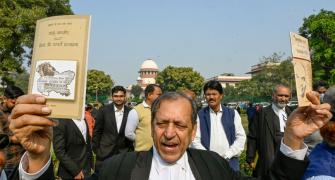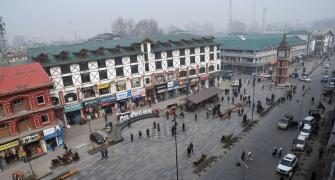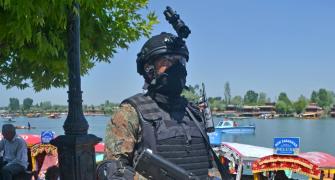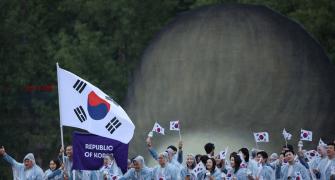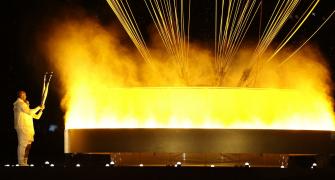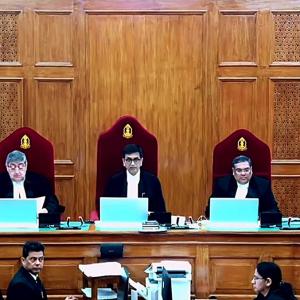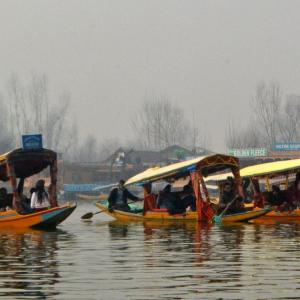'Article 370 offered very important protections that were related to people's day to day lives.'
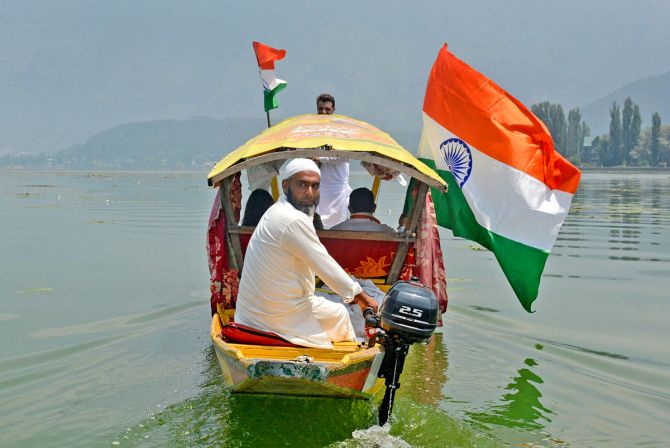
On December 11, 2023, a full four years and four months after the abrogation of Article 370 -- which offered political autonomy to the former state of Jammu and Kashmir -- by the Government of India on August 5, 2019, the Supreme Court upheld the decision undertaken by the Narendra Modi government.
While Article 370 came into existence in October 1949 -- after Raja Hari Singh, the then ruler of the princely state of Jammu and Kashmir, signed the Instrument of Accession with the Union of India on October 27, 1947, under extraordinary circumstances including the attack by tribals from Pakistan -- giving J&K autonomy over its internal affairs, making its own laws, own constitution and own flag, it always remained a bone of contention between the state and the Union of India.
Anuradha Bhasin, the editor of the oldest English newspaper in Jammu and Kashmir, The Kashmir Times, also a Kashmiri, discusses with Prasanna D Zore/Rediff.com the finer nuances of how the abrogation of Article 370 is hurting the ordinary people of the former state, now a Union Territory, and delves on the reasons why the Kashmir Valley, once a hotspot of violent protests, didn't see any major demonstrations after Article 370 was abrogated on August 5, 2019, and after the Supreme Court upheld the abrogation on December 11, 2023.
"It's very difficult to understand what is happening in Kashmir, but the sense of fear is pretty visible. People don't talk. People don't talk openly and that seems very abnormal in a place like Kashmir," Anuradha Bhasin says in the first part of a multi-part interview which was conducted recently.
Now that the Supreme Court has upheld the abrogation of Article 370 and to an outsider it would seem like the Valley has accepted -- seeing that there are no protests, leave alone violent protests, and the Valley has seen umpteen violent protests since 1953 -- the decision.
As someone from Jammu and Kashmir would you concur with this view of an outsider?
It's difficult to say. There is so much sense of fear and surveillance that people haven't been speaking like (they would do) in the past.
There are no protests because that kind of narrative has been managed under excessive, say, militarisation, with lot of surveillance, lot of threats and intimidations to civil society, to political groups, to media persons, and in that kind of a scenario, the voices of the people have been effectively controlled.
It's very difficult to gauge how the people are actually reacting.
On the surface, there is silence in Kashmir. But it would be wrong to jump to the conclusion that this is acceptance.
At the moment, I would say the more appropriate word is surrender. But, is it really surrender? It's difficult to say.
Would you say it is tactical surrender?
I think that it seems more like it, but it's so difficult to gauge what really is the mood of the people and whether there would be a reaction and when there would be a reaction.
There was no reaction in the Valley even when Article 370 was abrogated by Parliament on August 5, 2019...
After 2019, it has been an absolute stamping down of any democratic space, of all democratic spaces. Before that, we had militarisation, we had militancy, but some spaces and some democratic expression did continue, did exist.
Right now, it's a very different kind of repression: It is silent, but it's repetitive.
For instance, there's a lot of monitoring and surveillance of people, of different groups of people, and wherever there is any kind of, even a sign of slight dissent, there is an immediate crackdown by the authorities through raids, through regular and repetitive raids, through (court) summons, through police summons, through snatching of electronic devices, and all of that.
So they maintained that kind of fear syndrome in which it is difficult (to stage protests or express views freely).
There are people who are being detained and constantly being detained, maybe released after a few days, but that's all is going on. It's just that we don't get to know because the media is not reporting and the media is not reporting because the media is under more fear than anybody.
It's very difficult to understand what is happening in Kashmir, but the sense of fear is pretty visible. People don't talk. People don't talk openly and that seems very abnormal in a place like Kashmir.
Did you get to speak to people in the Valley after the Supreme Court upheld the abrogation of Article 370?
I don't think anybody was expecting much. The expectations were not huge after what happened in 2019.
Ordinary people, the few people I spoke to, are people from civil society or academia or just ordinary people, but affluent people. And they said, the ordinary people, like say a rickshawallah, a small shopkeeper or labourer, they probably had more hopes (from the Supreme Court).
These people said, maybe the (Supreme) court is not going to let us down, not to this extent. There were some hopes which have been completely dashed.
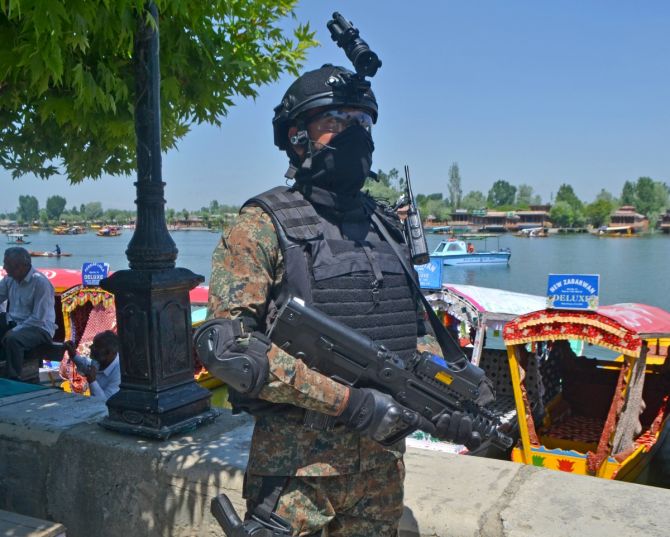
Has anything changed on the ground in the Valley since August 5, 2019 when Article 370 was abrogated?
Article 370 wasn't just a sentiment. Of course, autonomy had been whittled away. And a lot earlier used to be said that it's (the autonomy that Article 370 guaranteed to the state of Jammu and Kashmir when it acceded to the Indian Union in October 1947 after Raja Hari Singh signed the Instrument of Accession with the Indian Union) not as meaningful as it was before the 1990s.
But did the state of Jammu and Kashmir have any autonomy after August 8, 1953 when Sheikh Abdullah was arrested? Many historians claim that whoever came to power in J&K after 1953 always did the bidding of New Delhi...
Jammu and Kashmir had autonomy under Article 370. The initial arrangement, of course, was that the Centre would control only foreign affairs, defense and communication.
And gradually after 1953, they started whittling away autonomy, extending the Union laws into Jammu and Kashmir, but (in that period the Union laws did) not kind of tamper with Jammu and Kashmir's own laws. The central laws were being extended, and in the next two decades, or maximum three decades (after 1953), most of the autonomy had already been eroded.
But what remained was the basic structure: The J&K constitution existed; the J&K flag existed; the J&K laws existed.
Now, this may sound very emotional, but it's not just emotional, because Jammu and Kashmir had its own set of laws, particularly with respect to jobs, with respect to land. All those protections have now gone with (abrogation of Article) 370.
Article 370 offered those very important protections that were related to people's day to day lives.
Now, at least 26 land-related laws have been changed, massively restructured (after the Article 370 was abrogated on August 5, 2019).
The central laws have been brought in; old laws have either been amended or totally done away with. That is impacting people: For instance, the land reforms that happened (after new central laws kicked in). The land reforms (undertaken by successive state governments in J&K till 2019) were indeed landmark, but within J&K, they had also not been implemented very well.
For instance, while there were peasants who got possession of the land, they did not have their papers in order. These were poor people. These were people who were not aware, but their life certainly became better (because of the implementation of these land reforms) but in the administration there was lot of corruption. So they would never get their papers in order.
They don't have ownership papers. They only had possession of the land. The way the state operated in the past was that the state protected the rights of the people to possess that land. They didn't dislodge them. They did not disrupt them.
The land mafia did not exist in a big way in Jammu and Kashmir. So they continued with their lives.
Now suddenly (after the abrogation of Article 370) the new state (being a Union Territory the Union government administers Jammu and Kashmir now) is telling them that you are encroachers on these lands. That has happened in a lot of cases.
If the lands are being taken up for development projects now (after August 5, 2019) more easily under the new laws, they are not being paid compensation.
- Part 2 of the Interview: 'We've had no democratic government in J&K since 2018'

